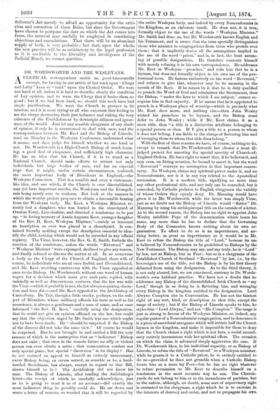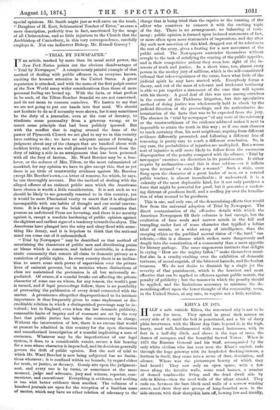DR. WORDSWORTH AND THE WESLEYANS. A CLERICAL correspondent scolds us,
good-humouredly enough, for having in our article of last week upon "Clergy and Laity" been so "hard" upon the Clerical Order. We were not hard at all, unless it is hard to describe clearly the condition of Lay opinion, and to warn the Clergy that it bodes them no good ; but if we had been hard, we should this week have had ample justification. We want the Church to prosper in its mission, and it is most trying to all who entertain that feeling to see the clergy destroying their just influence and risking the very existence of the Establishment by downright silliness and ignor- ance of the world. Just let any sensible clergyman of any shade of opinion, if only he is accustomed to deal with men, read the correspondence between Mr. Keet and the Bishop of Lincoln, read on Monday in the Wesleyan Conference, understand what it means, and then judge for himself whether we are hard or not. Dr. Wordsworth is a High-Church Bishop of much learn- ing, a good deal of eloquence, and sufficiently high character. He has an idea that his Church, if it is to stand as a National Church, should make efforts to attract not only individuals, but large bodies of men, and has an especial hope that it might, under certain circumstances, reabsorb the most important body of Dissidents in England, the Wesleyan Connexion. That is a sensible and even a statesman- like idea, and one which, if the Church is ever disestablished, may yet have important results, the Wesleyans and the Evangeli- cals being nearly sure to coalesce. But look at the manner in which the worthy prelate proposes to obtain a favourable hearing from the Wesleyan body. Mr. Keet, a Wesleyan Minister, re- cently lost a daughter, who was buried in the churchyard of Owston Ferry, Lincolnshire, and directed a tombstone to be put up, " in loving memory of Annie Augusta Keet, younger daughter of the Rev. H. Keet, Wesleyan Minister,"—surely as innocent an inscription as ever was placed in a churchyard. It con- tained literally nothing except the description essential to iden- tify the child, nothing which would not be recorded in any official registry. The Vicar, however, the Rev. G. E. Smith, forbade the erection of the tombstone, unless the words " Reverend " and " Wesleyan Minister " were expunged, declined to give any reason, and finally refused to discuss the matter at all. In so numerous a body as the Clergy of the Church of England, there will, of course, be individuals who are at once foolish and ill-conditioned, and Mr. Keet. avoiding controversy with the Vicar, appealed at once to the Bishop. Dr. Wordsworth, without one word of human regret for a decision which must give such pain, replied, with unkindly as well as discourteous curtness, that the law was with the Vicar—which it probably is not, the law always requiring discre- tion and bona fides—and Mr. Keet appealed to the Archbishop of Canterbury. Dr. Tait, though a little cranky, perhaps, on the sub- ject of Ritualists, whose millinery offends his taste as well as his conscience, is always a gentleman and a man of sense, and at once informed " the Rev. H. Keet," carefully using the designation, that he could not give an opinion offhand on the law, but could say that the objection urged by Mr. Smith was one which ought not to have been made. He " should be surprised if the Bishop of the diocese did not take the same view." Of course he would be surprised. Has he not brought in and carried a Bill the very essence of which is the assumption that an " indiscreet " Bishop does not exist ; that even in the remote future no silly or violent person can ever obtain a mitre ; that consecration confers not only special grace, but special " discretion in its display ? Has he not resisted an appeal to himself as entirely unnecessary, every Bishop being, ex rerum naturd, as sensible as he, a hard- headed Scotchman, has always, except in regard to that Bill, shown himself to be ? The Archbishop did not know his man. The Bishop of Lincoln, after reading the Archbishop's letter—the receipt of which he carefully acknowledges, just as he is going to treat it as of no account—did exactly the most indiscreet thing he possibly could do. He sat down and wrote a letter of reasons, so worded that it will be regarded by the entire Wesleyan body, and indeed by every Nonconformist in the Kingdom, as an elaborate insult. He does not, it is true, formally object to the use of the words " Wesleyan Minister." Mr. Smith had done so, but Dr. Wordsworth knows English and his Testament, and is aware that the term specially distinguishes those who minister to congregations from those who preside over them ; that it implicitly denies all the assumptions implied in the use of the word " priest," and is, in fact, the least assum- ing of possible designations. He therefore contents himself with merely refusing it in his own correspondence. He addresses Mr. Keet as Wesleyan " preacher," and tells him that he is a layman, but does not formally object to his own use of the pro- fessional term. He fastens exclusively on the word "Reverend," and refuses to give that, whatever may be its meaning in the mouth of Mr. Keet. If he means by it that he is duly qualified to preach the Word of God and administer the Sacraments, then the Bishop, " under the laws to which I am subject," cannot re- cognise him in that capacity. If he means that he is appointed to preach in a Wesleyan place of worship—which is precisely what Mr. Keet does mean, and nothing else—then. John Wesley wished his preachers to be laymen, and the Bishop must defer to John Wesley ; while if Mr. Keet claims it as a mere title, then "a title is a distinctive attribute belonging to a special person or class. If I give a title to a person to whom it does not belong, I am liable to the oharge of flattering him and of wronging those to whom that title does belong."
With the first of these reasons we have, of course, nothing to do, except to remark that Dr. Wordsworth has chosen a most ill- judged pretext for asserting the special sanctity of Church-of- England Orders. He has a right to assert that, if he believes it, and may even, on fitting occasion, be bound to assert it, but the word " Reverend " conveys no assumption in that important contro- versy. No Wesleyan claims any spiritual power under it, and no Nonconformist, nor is it in any way related to the Apostolical succession. It is a modern title, signifying no more than any other professional title, and not only can be conceded, but is conceded, by Catholic prelates to English clergymen the validity of whose Orders they openly deny. Dr. Manning would have given it to Mr. Wordsworth while the latter was simply Vicar, just as we doubt not the Bishop of Lincoln would " flatter" Dr. Manning by using his archiepiscopal title on the outside of a letter. As to the second reason, the Bishop has no right to appoint John Wesley infallible Pope of the denomination which bears his name, any more than he has to declare that the Governing Body of the Connexion knows nothing about its own or- ganisation. To affect to do so is an impertinence, and no- thing better, as great an impertinence as it would be in Mr. Keet to refuse the Bishop the title of "Lord," because its use is believed by Nonconformists to be prohibited to Bishops by the New Testament. The Bishop may say, and say truly, he is "Lord" by law, not as Bishop, but as Peer ; but so is a clergyman of the Established Church of Scotland " Reverend " by law, i.e., by the Sovereign's use of the title, yet the Bishop is by his first theory debarred from using the designation. As to the third theory, it is not only absurd, but, we are convinced, contrary to Dr. Words- worth's own habitual practice. We have not a doubt that he addresses any Bishop of the disestablished Irish Church as "my Lord," though in so doing he is flattering him, and wronging every Bishop in the kingdom entitled to the designation. Lord Alwyne Compton sits in Convocation. He has not the faintest right of any sort, kind, or description to that title, except the usage of society ; but if the Bishop of Lincoln speaks to him, he styles him " Lord Alwyne," and not "Mr. Compton." The usage is just as strong in favour of the Wesleyan Minister, or, indeed, any regular pastor of a Nonconformist congregation, and to denounce it is a piece of sacerdotal arrogance which will irritate half the Church laymen in the kingdom, and make it impossible for them to deny that the Church claims a right which is not hers, a social ascend- ancy entirely inconsistent with her spiritual offers. The occasion on which the claim is advanced deeply aggravates the case. If Dr. Wordsworth likes, in his individual capacity, or as Bishop of Lincoln, to refuse the title of "Reverend" to a Wesleyan minister, while he grants it to a Catholic priest, he is entirely entitled to do so—provided he does not grumble when a Catholic Bishop treats him as a mere lay Peer—but he has no right whatever ito refuse permission to Mr. Keet to describe himself • on a tombstone in the most accurate way he. can. The Church- yards do not belong to him or to the incumbents of parishes, but to the nation, although, no doubt, some sort of supervisory right is entrusted to the clergyman, a right which he is to exercise in the interests of decency and order, and not to propagate his emir
special opinions. Mr. Smith might just as well carve on the tomb, " Daughter of H. Keet, Schismatical Teacher of Error," as erase a mere description, perfectly true in fact, sanctioned by the usage of all Christendom, and so little injurious to the Church that the Archbishop of Canterbury, in this very correspondence, carefully employs it. Not one indiscreet Bishop, Mr. Russell Gurney?































 Previous page
Previous page